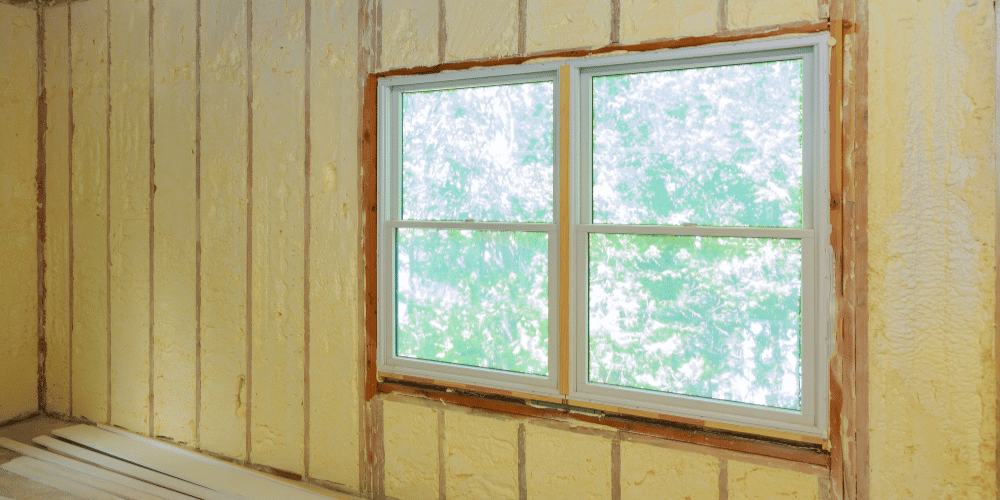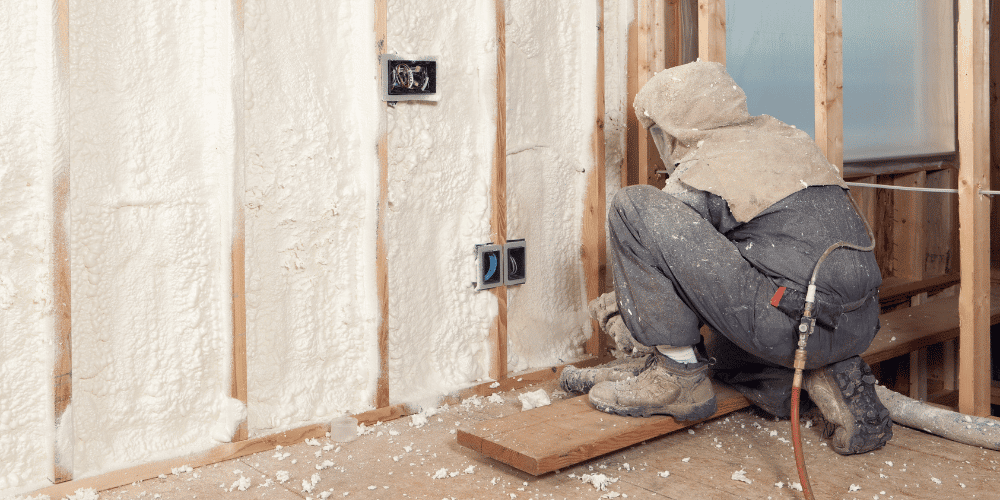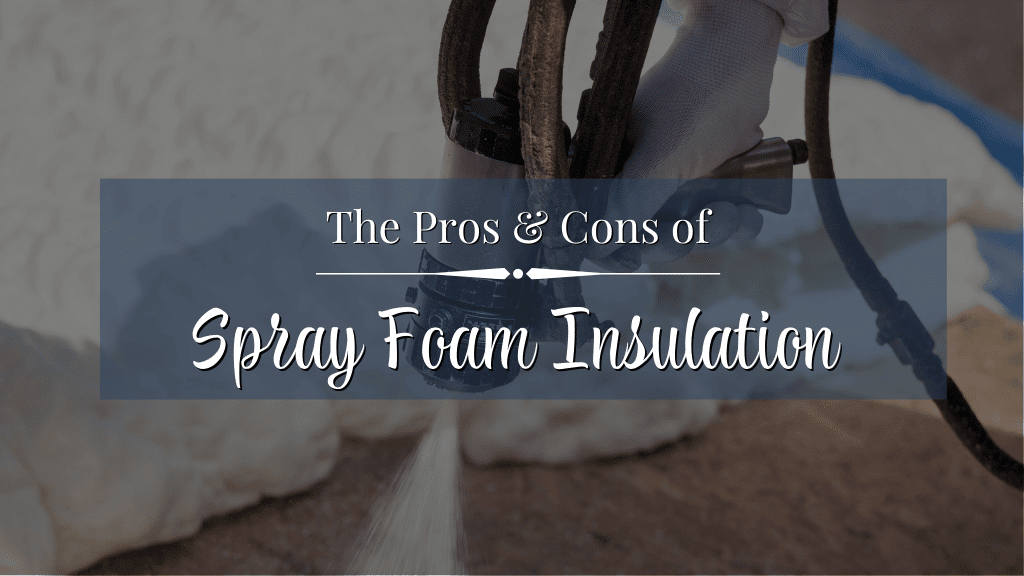First introduced to the market in 1986, spray foam insulation quickly gained traction in many new construction projects due to its comfort and energy efficiency. Since then, it’s become one of the more popular options for all insulation jobs because of the benefits it offers and versatility.
If you’re considering spray foam for your home or business, it’s important to know both the advantages and drawbacks. And you’ll probably want to know what it is! With that in mind, here are the pros and cons of spray foam insulation.
What spray foam insulation is
As the name implies, spray foam is a type of insulation that is sprayed onto surfaces. It starts in liquid form and then expands to form a protective barrier as it dries. Spray foam insulation can be used in a variety of applications, including for walls, attics, roofs, basements, and more. It is one of the most efficient forms of insulation available and can help reduce energy costs and improve indoor air quality.

The pros of spray foam insulation
Now that we’ve gotten the definition out of the way, let’s talk about some of the benefits.
Reduced energy bills
We’ve chosen this one first for a pretty obvious reason. Spray foam insulation can help you save significant money on heating and cooling costs. You can expect about 50% savings from adding it to an uninsulated building. If you’re using it to replace or in conjunction with other types of insulation, you’re looking at around 30% more energy cost efficiency. That’s a lot of savings.
It provides support
Spray foam insulation is a great option for homeowners who need to provide additional support to their home. Specifically the closed-cell version. Because the product is so expansive, installers can seal corners and gaps that might otherwise be exposed. This product is the only one on the market that provides an airtight seal.
It can also add to the structural integrity of your home or business while reducing outside noise. This is simply something that fiberglass insulation can’t match. As a matter of fact, fiberglass offers no benefits in the way of structural support.
Spray foam is resilient
The insulation product expands rapidly into cracks and holes in crawl spaces, attics, and walls. Spray foam insulation is 24 times more resistant to air movement than other types of insulation. As a result, your home will stay cooler in summer and warmer during winter. This product can be used almost anywhere and offer the same advantage.
Water resistance
Closed cell spray foam insulation will not only protect your home or business from moisture, but also prevent water absorption. This means that your home will experience less damage from events like flooding if it is properly installed and maintained.
Spray foam also doesn’t contain any food source for bacteria, mildew, mildew or other microorganisms, even if it gets wet. This gives it a lower risk of pest infestation than other products on the market.
A reduction of indoor air contaminants
Due to its airtight nature, spray foam can greatly reduce the amount of pollen and dust that makes its way indoors. This not only provides you with cleaner air to breathe, but it will also help to keep your house cleaner. Another added benefit of this is reduced strain on your HVAC system, allowing you to save on maintenance and repair costs.
Spray foam lasts a long time
Spray foam insulation can last for decades if properly maintained. This means far less replacement and repair. This makes it a smart financial decision, even if the initial installation cost is a bit higher than other forms of insulation.
It’s environmentally friendly
Spray foam insulation is a better choice than other products if you are concerned about your home’s environmental impact. Along with providing the reduced energy consumption and protection against moisture damage, it also uses less materials to make the product. Of course, to maximize these benefits, you’ll want an expert to install it.
R-value
Assuming it’s installed properly by a professional to ensure it meets code, another big advantage to spray foam is that it won’t see a reduction in R-value as time goes on.
Open-cell products have a 3.5-per-inch age-related R-value while closed-cell products may offer as high as 7 per-inch.
When you compare spray foam to fiberglass then you realize just how much of a benefit this is. Not only is the R-value of fiberglass significantly lower to begin with, it sees a reduction over time. Because of this, it can require replacement. Sometimes in as little as 10 years. And that’s assuming it stays dry. In order to replace any fiberglass in your walls, the drywall will need to be torn down, creating even more cost.
When compared to what fiberglass insulation could wind up costing you in the long run, it only makes sense to spend a little extra on the spray foam to begin with.

The cons of spray foam insulation
To help you make an informed decision, let’s show you a few things you should know before you decide on foam insulation.
Spray foam costs more
As we’ve mentioned, there is greater cost involved with spray foam. Not only does the material itself cost more, but you’ll only gain the full advantage of it by using a qualified professional to install it.
Fiberglass insulation is certainly less expensive than spray foam. Sometimes it can be a third of the cost per square foot. But it’s important to take into consideration the lack of benefits it offers when deciding which type of insulation you’ll use.
It requires proper installation
When it comes to adding spray foam insulation to your home or business, it should absolutely be installed by an experienced professional. Hiring someone that is new to the industry, or trying to do it yourself can greatly reduce the benefits and cause a lot of problems. In some instances, an inexperienced installer may not properly get into cracks and crevices, and in extreme cases have been known to miss entire sections.
Just about anyone can install fiberglass insulation. At least when it comes to an attic or crawlspace. However, you have to remember that at some point it will need to be replaced.
Takeaways
Nothing’s perfect, right? While price and installation may seem like disadvantages when it comes to choosing spray foam insulation, as you can see, the benefits absolutely outweigh the drawbacks. From cost savings to the added support it offers, nothing comes close to matching the quality and efficiency.
If you’re ready to add spray foam insulation to your home or business, reach out to a trusted, experienced, and qualified installer. We’re sure you won’t regret it.

